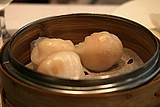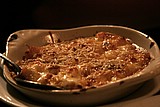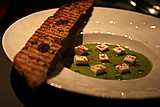Home |
Restaurants by City
|
Food Photography |
Archive | Philosophy |
![]()
Right now we are eating in Seattle, Washington.
|
Wednesday
2005
Permalink
|
Wacky Reader, March 16, 2005 If I'm going to take up bandwidth and hard drive space blabbing my opinions, then it's only reasonable to expect criticism. And this site has gotten its fair share. Mostly I just let it go and let it be part of the texture of the site. But today's feedback on yesterday's post by Debbie (e-mailed to me, not posted) is so nutty that I can't pass it by. And please note: for anyone who is a vegetarian, I respect you, and have no problem with you. I can even recommend a restaurant or two that will blow you away with their incredible vegetarian food. The exchange below is not about vegetarians and not eating meat. It's about this reader's hostility and inappropriate moral equivalency. OK. Enough caveats. I received the following mail:
My response:
Now I feel better.
|
|
Our Sponsors
Free Car Listings Hot Tubs Stools Saunas Bar Stools - Calendar and Event Schedules - Food Events and Calendars - Wine Events and Calendars - Digital Photography Resources - Software for Advertisers - Jewish Gifts and Judaica - Howard Stern Podcast - ponytailed blogger Jonathan Schwartz

Browse tastingmenu
Home |
Restaurants by City X |
Food Photography |
Archive | Philosophy |
![]()
Free eBooks: All About Apples
| Autumn Omakase
More:
Discussion |
Cool Food T-Shirts |
Ingredients
| Markets |
Recipes
Search |
Blog FAQ |
Other
Blogs
Best of tastingmenu
|
City View
Entry: July 6, 2006 |
Blue Plate
Entry: June 19, 2006 |
L'Atelier de Joël Robuchon
Entry: July 18, 2006 |
Browse by City
Boston | Chicago | Houston | Las Vegas | Los Angeles | Maui | New York | Philadelphia | Portland | San Francisco | Seattle | Toronto | Utah | Vancouver | Washington D.C.
Bangkok | Beijing | Hong Kong | Seoul | Tokyo
Amsterdam | Berlin | Italy | London | Madrid | Paris | Vienna
Browse by Month
2006
2005
2004
2003
2002
2001
Comments, questions, or feedback:
info / at / tastingmenu / dot / com
All pages Copyright (c) 2001-2006 tastingmenu.com
Last modified 01/30/07.



